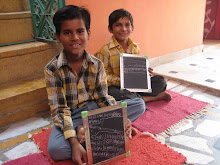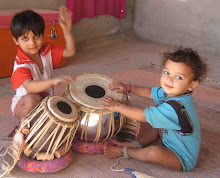I have a wonderful friend who loves to go to the symphony. We went together once and he sat like Rodin's The Thinker the whole time, while I shifted from one side of the seat to the other, reached for popcorn that wasn't there and clapped at all the wrong times. A few days later over breakfast, I asked him what he was doing and he said, "It's the best way for me to really see the music."
Fast-forward three years and three million cultural miles and I'm at The Merasi School with Sarwar Khan. We were talking about the Merasi musical legacy, a precious stand of songs that could easily wash away with the desert sands as modernization charges across India. "The thing is," Sarwar said, sweeping his hands towards the classrooms. "The kids observe with their ears. If there's no music being played, there's nothing to observe."
And it makes sense. The Merasi say they cry, sleep and laugh in rhythm, little boys and girls are as comfortable with a drum as they are with holding their mothers' hands. Music seeps through wind and time with a powerful cultural osmosis that is vanishing rapidly. "So it seems like part of what we're tying to do here," I said, "is put a somewhat more formal shape and a form into a style of learning that had a much more informal means of transmission." "Sure," Sarwar said. "We're giving them classes." Which was, of course, an infinitely more concise way of saying what I'd been swinging at.
So at The Merasi School, we learn with all our senses in all different ways. We see the landscapes in sounds and hear the loudness in landscapes. Our learning styles are as different as our handwriting, as distinct as our thumbprint. Each child that walks in the door brings a toolbox of potential learning matches that can be ignited if we commit to not just learning the word or the book, but learning the world.
Subscribe to:
Post Comments (Atom)


No comments:
Post a Comment